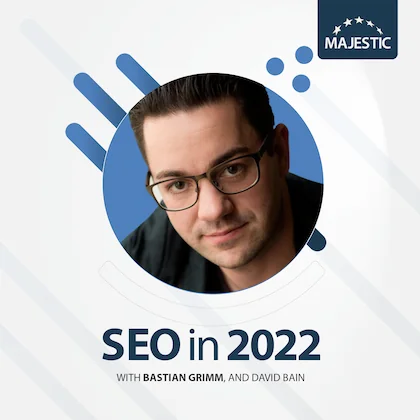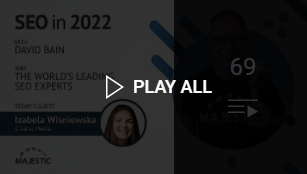-
Site Explorer
- Majestic
- Summary
- Ref Domains
- Backlinks
 New
New Lost
Lost- Context
- Anchor Text
- Pages
- Topics
- Link Graph
- Related Sites
- Advanced Tools
- Author ExplorerBeta
- Summary
- Similar Profiles
- Profile Backlinks
- Attributions
- Compare
-
Link Tools
- My Majestic
- Recent Activity
- Reports
- Campaigns
- Verified Domains
- OpenApps
- API Keys
- Keywords
- Keyword Generator
- Keyword Checker
- Search Explorer
- Link Tools
- Bulk Backlinks
- Neighbourhood Checker
- Submit URLs
- Experimental
- Index Merger
- Link Profile Fight
- Mutual Links
- Solo Links
- PDF Report
- Typo Domain
- Free SEO Tools
-
Support
- Blog

- Support
- Get started
- Tools
- Subscriptions & Billing
- FAQs
- Glossary
- How To Videos
- API Reference Guide

- Contact Us
- About Backlinks and SEO
- SEO in 2024
- Link Building Guides
- Webinars
- Blog
Are you prepared for Platform-less, server-less SEO on the edge?
Bastian Grimm
Bastian's tip follows on from Nick's, highlighting that Platform-less, server-less SEO has the potential to make several SEO operations much more efficient.

Are you prepared for Platform-less, server-less SEO on the edge?
Bastian says: "SEO on the edge, or platform-less SEO, is a really exciting topic because historically when we try to optimise different systems, such as CMSs and eCommerce platforms, it requires resource availability. You have to make business cases, and you have to fight with different stakeholders. Often, one of the key challenges in SEO is to actually overcome these obstacles and get things implemented. However, with sever-less SEO, you can take away some of this pain because you're essentially already implementing certain changes and optimisations. Not on the platform itself, but rather on what we call 'the edge'.
An example of the edge is a CDN like CloudFlare, where they have a technology called Workers. The idea is that you don't necessarily have to make changes on the respective platform. Instead, you rely on this technology, or the CDN provider you're already using, to get things done. This can be a fantastic solution for getting things done quickly, because you don't have to wait in the queue for the next iteration of development.
This means you can get things done relatively quickly, so it is definitely one of the big topics for 2022. You can essentially use it as a testing ground. You can use the edge to get stuff done right away, and then prove the impact to stakeholders. With this information, you can build your business case, and get a proper implementation done afterwards. It's a very exciting concept to help SEOs move significantly faster."
Is there any real need to consider SEO on the edge for SEOs who are happy with their current platform, have full access to everything and are in control of new platform development?
"In the rare case of a platform that's extremely flexible, and you're fully controlling, there's probably less of a need. However, server-less SEO is very easy to implement. I referred to CloudFlare Workers, and it's essentially just a piece of JavaScript. The complexity of creating something is very small. Even with very limited development skills, you can get quick fixes done in literally 10 minutes. All you do is create your couple of lines of code, hit the Workers 'deploy' button, and it's done. Therefore, in most cases, you are significantly slower, even if you're under full control of the release planning.
The other benefit is it's extremely powerful for testing, as well as classic SEO fixes. One of the things we're doing is split-testing for SEO purposes. You can do this using Workers, with very small implementation effort. This is a very nice way to benefit from this technology without having to do much else."
Is this something that all SEOs need to be aware of, or is it only relevant for SEOs in enterprises?
"There is a huge benefit for larger organisations, because they often move slower due to higher levels of complexity, stakeholders, and politics. However, even if you have smaller sites you could use it. We've been utilising Workers a lot on smaller platforms with Shopify, because until recently it didn't really allow you to change the 'robots.txt' file. It's not necessarily only for large or small, it really depends on what situation and setup you're dealing with, and then how you could incorporate it to help you be more efficient."
What specific elements will this technology be used for, and what are the aspects of SEO where you definitely wouldn't use platform-less SEO?
"The beauty - and also the danger - of SEO on the edge is that you have full access to everything, so you can test whatever you can think of. I could test anything from different title tag variations to more complex things such as changing content or moving HTML elements around. You are fairly limitless, because it gives you access to all the elements but again - this can be dangerous. If you are modifying things on the edge that are implemented differently on your platform, such as a shop or the CMS, you could introduce conflicting code or produce unforeseen behaviour. It's very important that you have proper communication when using this powerful weapon. Make stakeholders aware that certain things are being done that are suddenly happening at a different place."
What are a few initial first steps that SEOs need be aware of when they first discover this technology? What are the first few things they should probably test to get the biggest quick wins?
"You need a bit of technical experience, but not too much, which is what I really like about it. The CloudFlare technology is essentially JavaScript, and they have a very well-documented section on their homepage that gives you all the info on API's, functionality, and pre-made code samples. Entry into the topic is relatively straightforward.
You need a CloudFlare account, which is free for everyone until a certain size limit, and then you need to be somewhat familiar with JavaScript, so you can modify at least the ready-made examples. Then, to understand the complexity, you can try to access some basic elements like page titles, meta descriptions, or paragraphs with content. Modify them to see what comes out of it. There is a Workers Playground element, which is just a simple sandbox. It gives an instant way to preview and test a Workers script directly in the browser, against any site. It makes everything super-easy because you can essentially deploy anything, just in this testing stage, and see the real-world output.
There's been a lot of discussions and posts about it recently. One of the platforms I suggest for this implementation is called Sloth. It's a meta-CMS, so essentially, it's a code creator for Workers. If you don't want to write code, you could also have them support you in creating the functionality based on Workers that you actually want. There are various approaches but I think, barrier-wise, it's fairly easy to get into it."
What are your general thoughts on best practice for page title and meta description at the moment?
"There's been a lot of recent update chatter around Google dealing with page titles differently and using values from headlines, and even anchor texts. However, on page titles, the biggest thing we still see with a lot of platforms is they're just creating internal duplication in various ways, forms and formats. I would certainly make sure my page titles are still unique, and you have certain keyword inclusion. It's not a list of keywords, or keyword-stuffing them for the sake of it. Just make them relevant and click-friendly - and take care of readability. This hasn't really changed that much. If Google decides to, for whatever reason, rewrite your titles, then maybe they weren't that great in the first place - so that's something you probably should revisit.
It's great because you can easily test these things. You can test different types. Do you want them to be a bit longer, or a bit shorter? Do you want to move the brand to the end or not? These are the things you can really test relatively quickly. One issue with testing is that people need to understand that you can't test on a one-on-one basis. You need to build groups. This is very important - otherwise, the results won't tell you much."
What are your general thoughts on the amount of time or eyeballs needed on a page title, for example, before we get statistical relevance and can be certain that something has performed better?
"Reaching the respective relevancy you need is probably one of the biggest topics in split-testing. It's not really possible to test something with 100 visitors. Yes, you might see a result - but is it actually relevant? I'd rather test chunks of pages that are somewhat the same. 20 in one bucket, then 20 in another and 20 in another. Make sure that they are somewhat comparable in terms of traffic. Also, you need to consider seasonality - when do you test, and what do you test?
As for duration, you also need to consider that Google needs to recrawl and reprocess things. Don't make the mistake of ending tests too early."
What's one thing SEOs can stop doing to spend more effort developing SEO on the edge?
"What fascinates me is how many people still 'chase the algorithm(s)'. I'd rather not do that and focus on the stuff I can somewhat control. I would move away from this reactive SEO - running after every trend you see out there is probably not the best use of time.
I'd rather be proactive and start using this. The best reason to use edge SEO right now is to test out things very quickly. Build a rough implementation and see what it does. If it works, fantastic. Make your case and roll it out into the platform. Be more proactive and not so reactive."
You can find Bastian Grimm over at www.pa.ag.
Choose Your Own Learning Style
 Video
Video
If you like to get up-close with your favourite SEO experts, these one-to-one interviews might just be for you.
Watch all of our episodes, FREE, on our dedicated SEO in 2022 playlist.
 Podcast
Podcast
Maybe you are more of a listener than a watcher, or prefer to learn while you commute.
SEO in 2022 is available now via all the usual podcast platforms
Don't miss out
Opt-in to receive email updates.
It's the fastest way to find out more about SEO in 2025.
Could we improve this page for you? Please tell us





